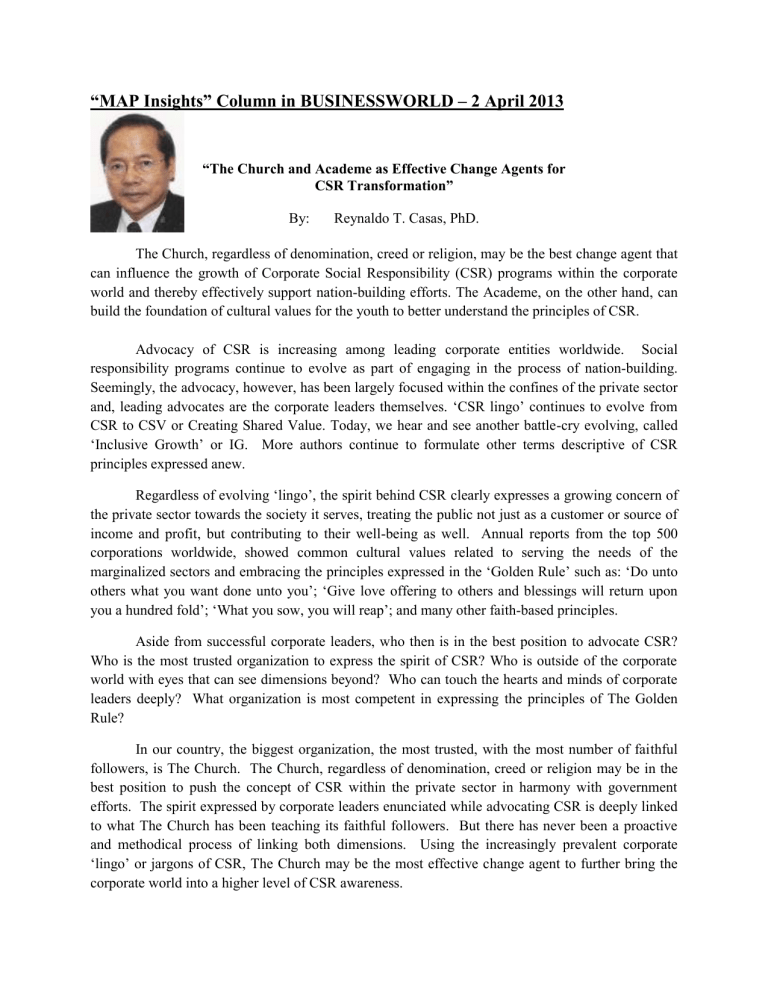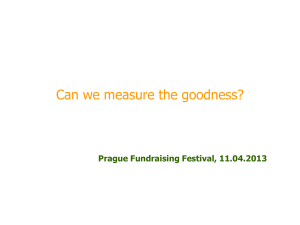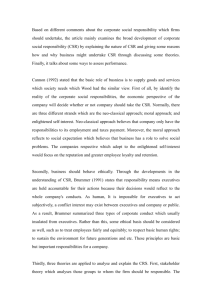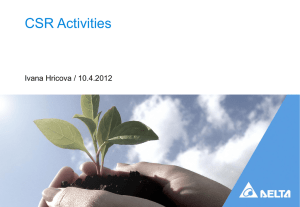Effective Change Agents for CSR Transformation

“MAP Insights” Column in BUSINESSWORLD – 2 April 2013
“The Church and Academe as Effective Change Agents for
CSR Transformation”
By: Reynaldo T. Casas, PhD.
The Church, regardless of denomination, creed or religion, may be the best change agent that can influence the growth of Corporate Social Responsibility (CSR) programs within the corporate world and thereby effectively support nation-building efforts. The Academe, on the other hand, can build the foundation of cultural values for the youth to better understand the principles of CSR.
Advocacy of CSR is increasing among leading corporate entities worldwide. Social responsibility programs continue to evolve as part of engaging in the process of nation-building.
Seemingly, the advocacy, however, has been largely focused within the confines of the private sector and, leading advocates are the corporate leaders themselves. ‘CSR lingo’ continues to evolve from
CSR to CSV or Creating Shared Value. Today, we hear and see another battle-cry evolving, called
‘Inclusive Growth’ or IG. More authors continue to formulate other terms descriptive of CSR principles expressed anew.
Regardless of evolving ‘lingo’, the spirit behind CSR clearly expresses a growing concern of the private sector towards the society it serves, treating the public not just as a customer or source of income and profit, but contributing to their well-being as well. Annual reports from the top 500 corporations worldwide, showed common cultural values related to serving the needs of the marginalized sectors and embracing the principles expressed in the ‘Golden Rule’ such as: ‘Do unto others what you want done unto you’; ‘Give love offering to others and blessings will return upon you a hundred fold’; ‘What you sow, you will reap’; and many other faith-based principles.
Aside from successful corporate leaders, who then is in the best position to advocate CSR?
Who is the most trusted organization to express the spirit of CSR? Who is outside of the corporate world with eyes that can see dimensions beyond? Who can touch the hearts and minds of corporate leaders deeply? What organization is most competent in expressing the principles of The Golden
Rule?
In our country, the biggest organization, the most trusted, with the most number of faithful followers, is The Church. The Church, regardless of denomination, creed or religion may be in the best position to push the concept of CSR within the private sector in harmony with government efforts. The spirit expressed by corporate leaders enunciated while advocating CSR is deeply linked to what The Church has been teaching its faithful followers. But there has never been a proactive and methodical process of linking both dimensions. Using the increasingly prevalent corporate
‘lingo’ or jargons of CSR, The Church may be the most effective change agent to further bring the corporate world into a higher level of CSR awareness.
Citing support for this concept, The Church was rated by the Philippine Trust Index as of
December 2012 conducted by EON and Ateneo de Manila University as having the most number of positive responses at 68% from 1,575 respondents, expressing “very much trust”. The Business sector had a lower rating at 15%, while the Government was at 12% rating.
As the ‘most trusted’ sector, the Church has to blend with the corporate ‘lingo’ encompassing the principles of CSR. How would acronyms such as CSR, CSV and IG be related to faith-based principles taken from Scripture? Inversely, what scriptural passages best describe the principles of
CSR? The cultural gap between the corporate world and religion can be linked best by The Church.
From the pulpit, The Church can break through the hearts and minds of corporate leaders when attending a prayer gathering by using jargons related to CSR blended with scriptural inspirations.
While The Church can easily touch the hearts and minds of the adult leaders in the corporate world, the Academe, on the other hand, is the instrument of change to seed and grow the principles of
CSR, this time in the hearts and minds of the youth. Beginning with basic principles of CSR crafted for the elementary level, the same set of cultural values can be scaled up at high school levels, eventually further expanded into the curriculum at the tertiary level. This could make the youth better prepared and more competent to appreciate and understand the principles of CSR, thus making them generative, ethical and strongly driven by deep meaning and purpose eventually in their chosen careers. The youth equipped with such orientation and preparation, is one sure way for CSR to get integrated or embedded into the core business. This could also be a pathway towards rapid organizational transformation. As in other countries, local dialects can be used to describe the cultural values of CSR for better appreciation by the youth, especially with our country’s diverse local dialects.
The evolution of CSR has introduced the phenomenon of ‘Rising Intangibles’ which is benefitting private enterprises engaged actively in caring for society. The ‘intangibles’, such as rise in brand name, goodwill, image, reputation, trust and confidence in the minds and hearts of the public ushers, as well, the rise of the corporate entity. Citing Standard and Poor’s statistics in 2011 show that most top 500 Corporations shared this common practice: that their Annual Reports to stakeholders was 80% social responsibility programs and the other 20% consisted of traditional financials such as income statement and balance sheets. This serves as further proof and incentives for others in the corporate world to adopt CSR, inspired by the belief that indeed blessings will return a hundred fold to those who extend their corporate wealth to a wider sphere of society.
Prescinding from the above discussion, there are indicators that when The Church advocates and relates CSR in its teachings, such can become a unifying force towards initiatives of nationbuilding. And when the Academe contributes to youth development in this way, potential leaders get readied at an early stage with healthy cultural values that are key success factors to organizational transformation towards successful adoption and implementation of CSR.
(The article reflects the personal opinion of the author and does not reflect the official stand of the
Management Association of the Philippines. The author is the Project Chair for CSV of the
Management Association of the Philippines and the Founder and President of Advance Renewables
Energy Inc. Feedback at map@globelines.com.ph
. For previous articles, please visit
< map.org.ph
>)







